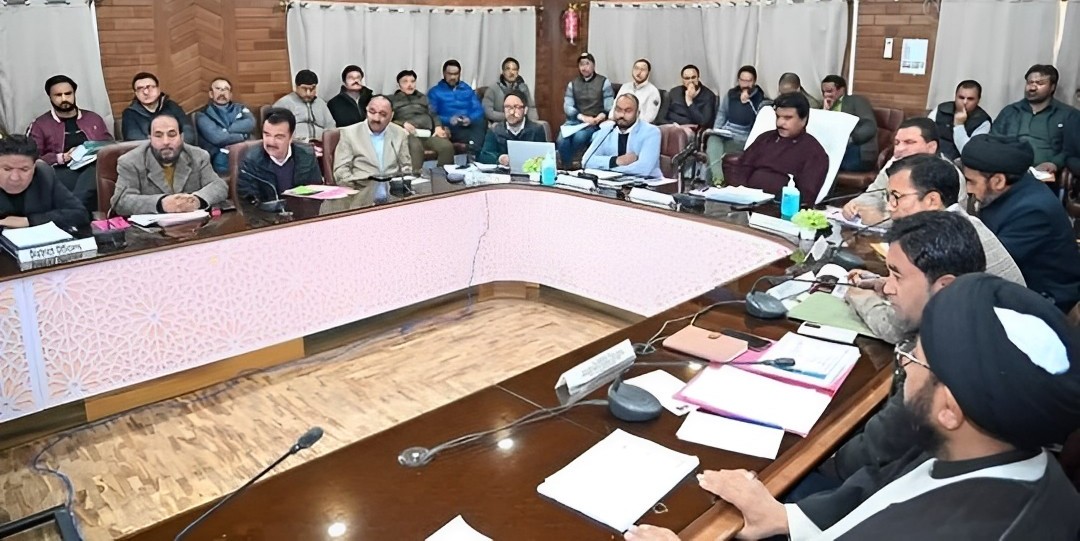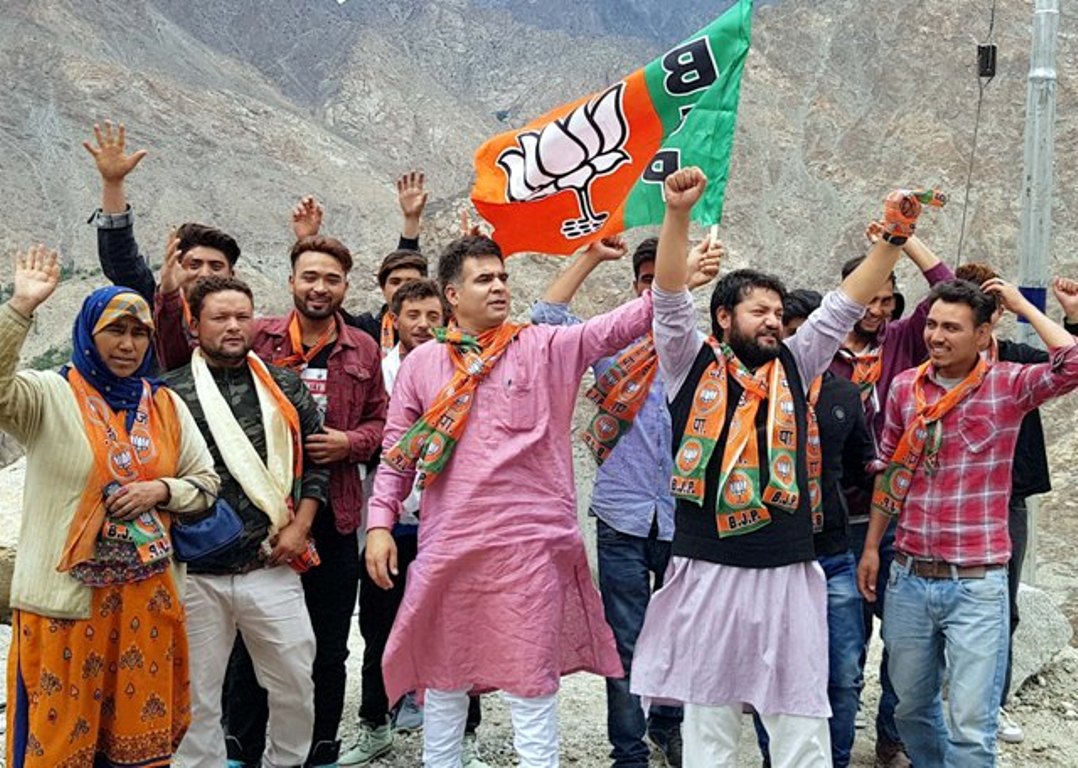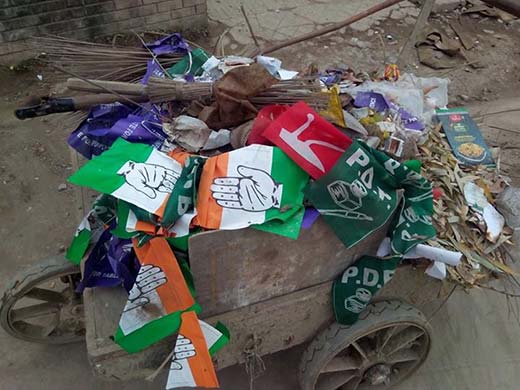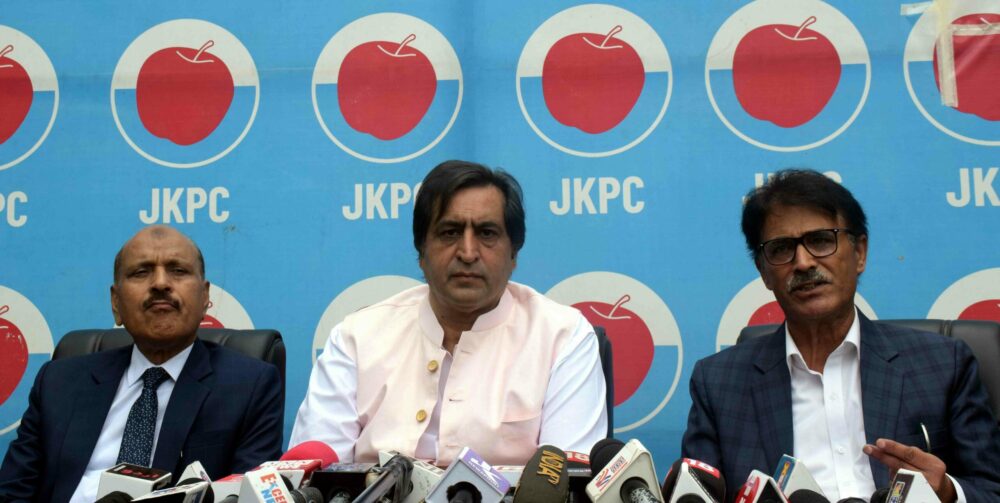As the Jammu and Kashmir administration is readying for panchayat and ULB polls this fall, the controversy has emerged from the high-altitude Kargil where the administration was desperate not to see JKNC’s plough, reports Masood Hussain

For many, politics is all about symbolism. This, however, does not discount the larger reality that symbols are fundamental to politics, especially in South Asia. Generations grow with the symbols their parties have and it hugely matters during elections in an electronic age where EVMs have replaced the paper ballot.
Post-2019, in Jammu and Kashmir, political parties are facing interesting challenges. And the one is about symbols.
Jammu and Kashmir Peoples’ Conference (JKPC) is one of the last-century political parties. Founded by Abdul Gani Lone, the brave politician from north Kashmir’s Handwara, in 1978, the JKPC used to have a lion as its party symbol.
“We contested the last assembly elections on the lion symbol in 1987,” Adnan Mir, the party’s post-2019 spokesperson, said. The party did not contest many elections later. “In 2014, when we contested we were given a table as an election symbol that we retained in 2019 as well.”

In January 2019, the party felt that the table in politics was too far away from the decision-making chair so the discussions started about having a new symbol. “Apple will be the symbol of JKPC. A symbol of economic power,” Sajad Gani Lone, broke the news on Twitter on January 30, 2019. “My thanks to Abbas Wani, ex-MLA Gulmarg. He conceptualised Apple as our party symbol. His idea was that our symbol should signify economic power.”
Apple is the principal peripheral economy of Kashmir and the party believes it will help them connect with the people better. The Election Commission of India (ECI) had earlier refused to revive their lion symbol.
It was the same case with the Jammu and Kashmir National Panthers Party (JKNPP), a Udhampur-based party that has ambitions of becoming a pan-Jammu and Kashmir party. In 1982, when Bhim Singh floated it, the idea was to move out of his home state too. Now battling for survival owing to internal bickering, the party has already lost the panther symbol. It has been given the bicycle, instead. Given the party situation, it remains to be seen if the bicycle gets some movement or retains the inertia it already is in.
Jammu and Kashmir Apni Party business tycoon Syed Altaf Bukhari launched post-2019 and has a willow, the cricket bat as its symbol.
However, it is the Jammu and Kashmir National Conference (JKNC) whose symbol – a plough – is the most used, known and oldest symbol in Jammu and Kashmir’s political landscape. Interestingly, it is also facing problems, not in Kashmir or Jammu but in the arid Ladakh desert, which operates as a separate Union Territory.
“We are facing challenges at every point, where we were not even expecting, we have to struggle,” Omar Abdullah told party workers last week. In Ladakh, he said the administration is desperate to ensure that JKNC should not use Hal (plough) as the election symbol in the Ladakh Hill Development Council elections.
“We knocked on the door of the High Court in this matter and the judge gave a verdict in our favour and directed the Ladakh administration to provide us with a Hul symbol. In the follow-up, the administration challenged the single bench decision before the division bench and filed objections spanning over 300 pages, but the bench upheld the single bench decision and we are satisfied.”
The story did not end here. Omar said the Ladakh administration is now planning to go to the Supreme Court against the division bench decision. The party later claimed that the Supreme Court refused to stay the Jammu and Kashmir High Court’s order on the grant of the ‘plough’ poll symbol for the party in the Ladakh Hill Council elections and asked the Union Territory administration to implement the court order and not make it an ‘ego issue’. “They then tried to get the contempt proceedings of the high court stayed. This was also refused by the Supreme Court,” the party said.
The Tradition
Any party having the ECI registration for its election symbol can contest anywhere across India. It can be in Lok Sabha, assembly and Urban Local Body and Panchayat polls. In Ladakh, however, this has become an issue for the administration. It is sort of a logo, an identity, that like businesses is crucial to the political parties also. Why is it happening?
“All this is being done because some people had a misconception that after 2019, the election symbol of the JKNC will be removed from Ladakh and only to prove this, the time of the court is being wasted and our little money is also being wasted,” Omar said.
The crisis was a quick outcome of the Ladakh election department’s decision to hold elections for the 26 seats of the 30-member LAHDC, Kargil, on September 10, to elect a new body. Four berths are being nominated by the Kargil district administration. A party requires 16 seats to secure a majority in the Council.
In the last five years, it was JKNC that led the Council. In the 2018 election, JKNC won 10 seats and Congress 8. PDP had garnered two seats and BJP one while there were five independents. Initially, NC and Congress shared power in the Council but later NC formed its Council with independents. PDP candidates switched over to BJP along with four nominated councillors that gave the rightwing party seven seats but no power.
For the 2023 elections, indications suggest JKNC and Congress will have a pre-poll and post-poll alliance. Rahul Gandhi and Omar Abdullah are speaking jointly to a gathering and made the announcement formally.
While the LAHDC Leh had its elections in October 2020, and has two more years to go the elections for two municipalities and 193 Panchayat’s – 98 in Kargil and 95 in Leh – are due later this year. However, insiders in the Ladakh administration said the ULB polls will be held only after the LAHDC Kargil elections.
In Kashmir
The bigger battle, however, is in Jammu and Kashmir where the ULB and Pachayat polls are slated to be held in September or a bit later. It is a huge exercise and involves two Municipal Corporations (Srinagar and Jammu), 19 Municipal Councils and 57 Municipal Committees, besides, nearly 40,000 Panchs and Sarpanchs. Unlike the 2018 polls that were boycotted by the JKNC, JKPDP and many others, almost everybody is participating. Their participation will make the exercise very interesting.

Though not in Jammu, in Kashmir it is also around the symbols. As the parties would like to contest on a party basis, the ruling BJP is keen that the elections should be held on a non-party basis.

“Even dozens of BJP leaders have already conveyed to their party leadership that like 2018 the panchayat and municipal as well as local bodies polls should be held on a non-party basis as they fear negative perception about the BJP could see them losing their ground to two big regional parties that had stayed away from last panchayat polls,” The Hindustan Times reported.
The newspaper quoted a BJP activist from Baramulla, who is already canvassing for his election: “Though BJP has done good work on developmental front and return of peace in J&K, especially Kashmir, still my relatives and friends have asked me to contest as an Independent candidate so they can easily vote for me. I have decided to contest as an independent candidate.”
Interestingly, however, the party would like to contest on a party basis in Jammu with the party symbol.
While the BJP’s Jammu and Kashmir president refused to comment, the newspaper quoted Altaf Thakur saying that the decision has to be taken by the Election Commission. “We will welcome it if the polls are held on a party basis,” he was quoted by the newspaper, insisting that the polls will improve the party tally. The party, according to Thakur, has a majority in nine councils and committees, 34 block development council members and more than 2200 elected panchayat members in Kashmir.
In 2018, elections were held for 39521 sarpanch and panch constituencies in 4483 Halqa Panchayats. Some of these constituencies did not find any contestants. By 2020, 13257 positions were vacant due to resignations, removals, election of sarpanchs as Block Development Council chairpersons, deaths as well and non-availability of candidates at the time of election. Among them, 1089 vacancies pertain to the office of sarpanch, whereas 12168 are panch vacancies. These were filled in October 2020. The Panchayat terms will conclude on January 9, 2024.
Process Initiated
The process for these elections has actually started. The Chief Electoral Officer has announced the schedule. The revised electoral rolls are being published later this month. There have been a series of meetings to review security. Recently Home Secretary Ajay Kumar Bhalla reviewed the situation in a high-level meeting. Reports indicated that part of the 400 additional companies of paramilitary forces deployed for Amarnath yatra may stay put for these polls.















